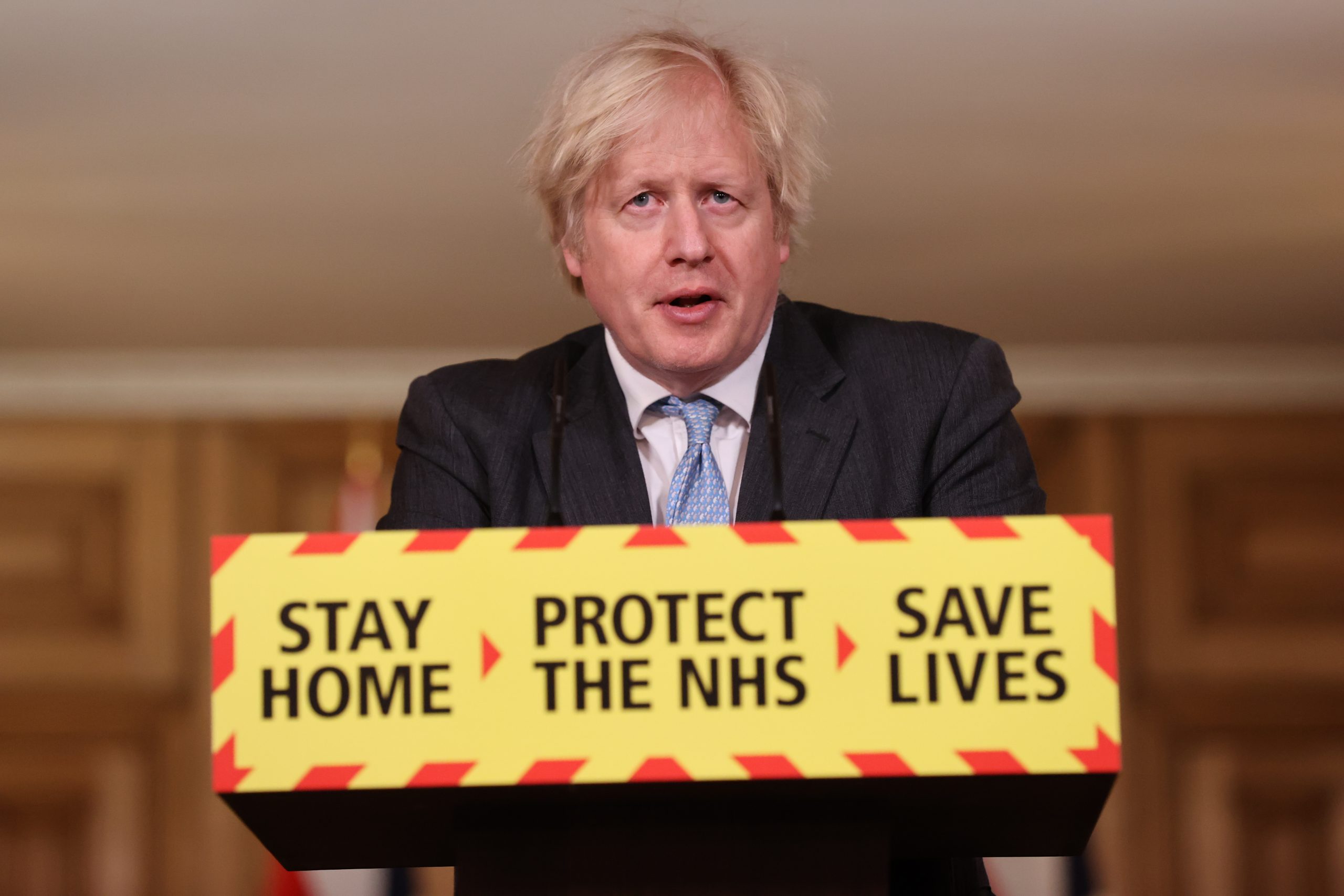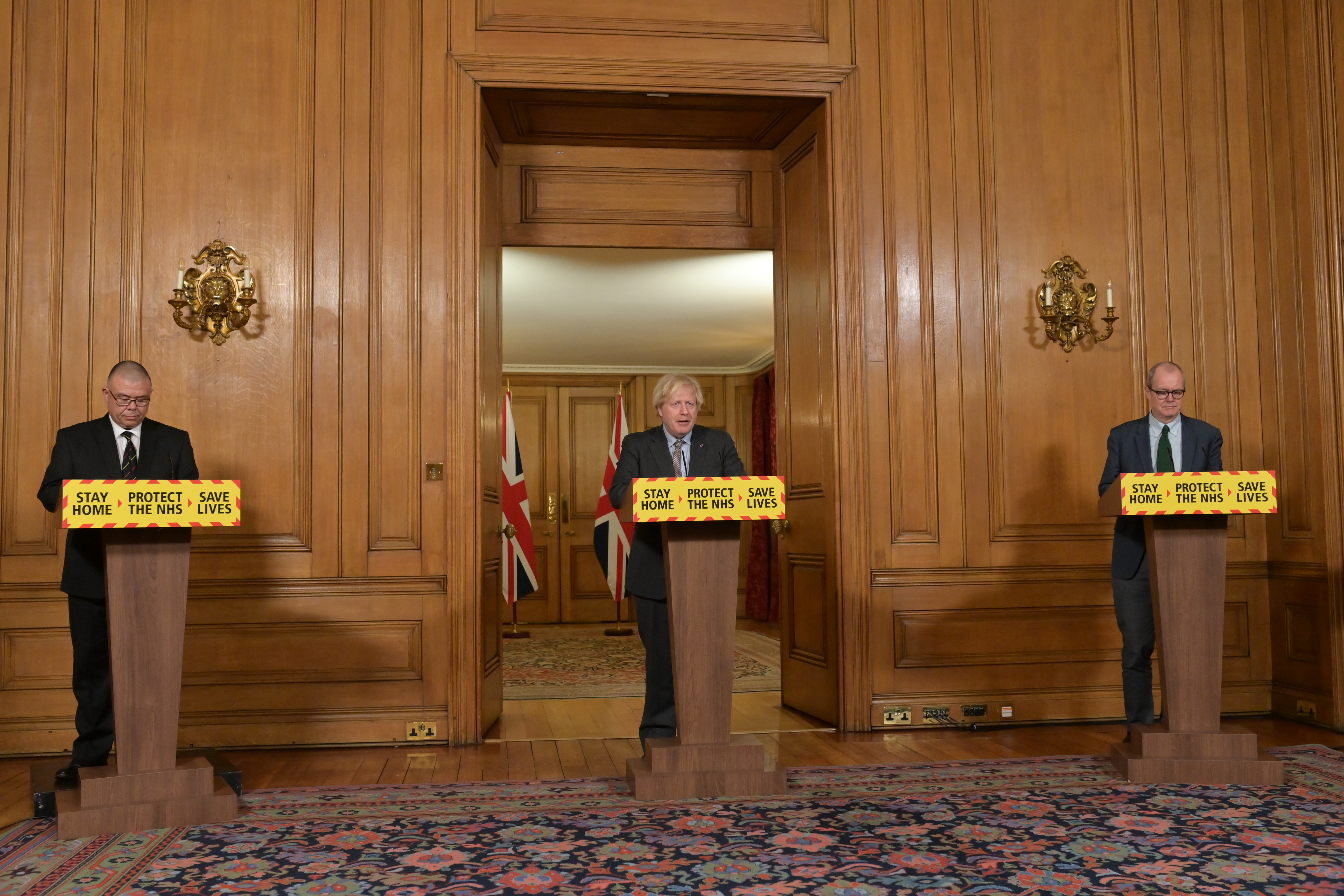When is the next lockdown review and what time will Boris Johnson address the nation?
It's coming very soon...

As Covid-19 cases decline around the country, Boris Johnson is set to make an announcement about what comes next for the UK.
The next lockdown review will determine how the country moves out of the third lockdown, starting with the government's first priority of getting kids back to school after the lockdown ends.
It comes as cases of Covid-19 have fallen by up to two thirds, according to a REACT study from Imperial College London. The findings showed that infections had decreased dramatically from January into February, with the R number now at around 0.72 and the number of daily infections halving every 14.6 days.
Although rates remain high and the lockdown travel rules have recently been tightened, the news has provided hope that some restrictions will be lifted in the next lockdown review.
When is the next lockdown review?
The next review for lockdown will happen on February 22, Boris Johnson has confirmed, probably around 3.30pm.

The prime minister said, "I will be setting out a roadmap saying as much as we possibly can about the route to normality even though some things are very uncertain.
"Because we want this lockdown to be the last. And we want progress to be cautious but also irreversible.
GoodtoKnow Newsletter
Parenting advice, hot topics, best buys and family finance tips delivered straight to your inbox.
"So please continue to stay at home, protect the NHS and save lives."
It's thought that restrictions will only stay in force for a few more months and will begin to lift from March 8 with the roadmap out of lockdown. On this date, schools will start a phased return back to classroom teaching for everyone. After this time, grandparents will be able to see their grandchildren again thanks to the high uptake of the Covid vaccine in older age groups. According to the Telegraph, people will able to meet up with one other on a park bench or go for an outdoor picnic. The reopening of outdoor sports centres like golf courses and tennis courts will follow later in the month.
The same reports suggest that pubs and hospitality venues could open from the first weekend of April, giving families Easter lunch together.
However, there's no word on when people from different households will be able to meet up either indoors or outside.
While it's been confirmed that schools will certainly open from early March, it's thought that they could take on a phased return to allow for mass testing of all students and staff, before they re-enter the classroom.
This comes as the NHS has now reached the target of vaccinating 15 million people with either the Pfizer or Oxford vaccine before February 15. Vaccines Minister Nadhim Zahawi announced the good news on Twitter as he wrote, 'We will not rest till we offer the vaccine to the whole of phase1 the 1-9 categories of the most vulnerable & all over 50s by end April and then all adults.'
This was confirmed by the prime minister on February 15, however, he said that lockdown measures wouldn't be lifted until it was safe to do so.
"It’s true, we have vaccinated more than 90 per cent of those aged over 70 but don’t forget that 60 per cent of hospital patients with Covid are under 70." He said, "And although the vaccination programme is going well, we still don’t have enough data about the exact effectiveness of the vaccines in reducing the spread of infection.
"We have some interesting straws in the wind. We have grounds for confidence. But the vaccinations have only been running for a matter of weeks - and while we are learning the whole time - we don’t today have all the hard facts that we need.
"And the level of infection remains very high, with more people still in hospital today than at the peak last April and admissions running at 1,600 a day.
"So we have to keep our foot to the floor. And I can tell you today that the next million letters are landing on people’s mats right now, offering appointments to the over-65s and we are also contacting all those aged between 16 and 64 with underlying health conditions, as well as adult carers."
What happened in the last lockdown review?
Prime Minister Boris Johnson laid out the plans to protect the UK from the new variants of Covid until they "have administered enough vaccinations to free ourselves from the virus."
He added, "I am acutely conscious that at this moment, parents are balancing the demands of working from home with supporting the education of their children, businesspeople are enduring the sight of their shops or restaurants or other enterprises standing empty and idle and, sadly, too many are coping with the anxiety of illness or tragedy of bereavement."
It came as the number of people to die from coronavirus sadly reached 100,000 people.
Travel restrictions tightened
The main measure laid out as a result of the review was the strengthening of UK borders:
- The government closed all travel corridors.
- Anyone coming into the country has to have a negative Covid test 72 hours before leaving.
- They will also complete a Passenger Locator Form, which officials will check before travellers board.
- They then have to self isolate for ten days on arrival.
Stay at home regulations are in force and it's now illegal to leave home to travel abroad, the PM stressed. Governmental bodies will reinforce these measures at ports and airports, asking people why they are travelling. If they don't have a good reason, they'll have to go home.
Following this, the government has now mandated hotel quarantine with 33 countries on a 'red list'. Anyone travelling back from countries with known variants, including South Africa and Brazil, will have to self-isolate in a government-approved hotel for 10 days at their own cost.
The prime minister said at the time, "I can announce that we will require all such arrivals who cannot be refused entry to isolate in government-provided accommodation - such as hotels - for ten days without exception. They will be met at the airport and transported directly into quarantine."
Update on schools reopening
The prime minister set the date for schools to re-open to March 8.
He said in the address, "Our aim will be to set out a gradual and phased approach towards easing the restrictions in a sustainable way, guided by the principles we have observed throughout the pandemic, beginning with the most important principle of all: that re-opening schools must be our national priority and the first sign of normality beginning to return should be pupils going back to their classrooms."

"I know how parents and teachers need as much certainty as possible, including two weeks’ notice of the return of face-to-face teaching.
He said, it "will not be possible to re-open schools immediately after the February half term."
"I know how frustrating that will be for pupils and teachers who want nothing more than to get back in the classroom and for parents and carers who have spent so many months juggling their day jobs not only with home schooling but with meeting the myriad other demands of their children from breakfast until bedtime. And I know too the worries we all share about the mental health of our young people during this prolonged period of being stuck at home."
"If we achieve our target of vaccinating everyone in the four most vulnerable groups with their first dose by 15 February – and every passing day sees more progress towards that goal – then those groups will have developed immunity from the virus by about three weeks later, that is by 8 March.
"We hope it will therefore be safe to commence the reopening of schools from Monday 8 March, with other economic and social restrictions being removed thereafter as and when the data permits."
As part of the extension of remote learning, the prime minister outlined what the government was doing to help. The scheme to donate a laptop for homeschooling is still up and running, as homeschooling is compulsory in this lockdown.
The prime minister confirmed that arrangements for free school meals would be prolonged. He also said that the government was developing a "programme of catch up" over the year. This will involve £300m of "new money to schools for tutoring" and work in collaboration with the education sector.
No lockdown measures lifted
Boris Johnson also confirmed that "we will not persist for a day longer than is necessary" with the lockdown. But he wasn't going to lift any of the measures just yet.
"If we do we run the risk of our NHS coming under still greater pressure, compelling us to re-impose every restriction and sustain those restrictions for longer."
He said that the R-rate appears to have reduced. The data, however, wasn't enough to pinpoint when it would be safe to "reopen our society and economy".

There currently isn't enough data to "judge the full effect of vaccines in blocking transmission". Nor is there enough evidence on the "extent and speed with which the vaccines will reduce hospitalisations and deaths". There's also little data on how quickly the vaccinations and lockdown measures could ease pressure on the NHS.
"What we do know is that we remain in a perilous situation, with more than 37,000 patients now in hospital with Covid, almost double the peak of the first wave.
He stressed that the "overall picture should be clearer by mid-February". As by then, we'll know "much more about the effect of the vaccines in preventing hospitalisations and deaths".
Good developments on the vaccine programme
The PM also noted the achievements of the UK's vaccination programme.
At the time, the UK had delivered just 6.8 million doses of the vaccine with 4 out of 5 over 80s having received their first dose. This was along with half of those aged under 80 and 3 in 4 care home residents.
Boris Johnson said, "And though it remains an exacting target, we are on track to achieve our goal of offering a first dose to everyone in the top four priority groups by the middle of February."
He also confirmed that the current evidence on vaccines showed that it was effective against the new UK variant.
Amy is Senior Digital Writer across Woman & Home, GoodTo and Woman, writing about everything from celebrity news to health, fashion and beauty features. When she isn't obsessing over the latest dress drop from Marks & Spencer, you'll most likely find Amy out running, or with a cup of tea in hand ready to dive into a gripping new Netflix series.